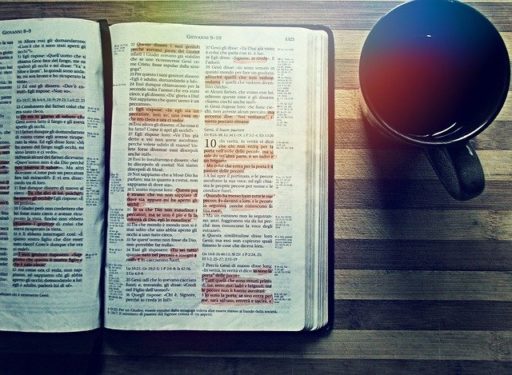Here’s a game: in the lines below, can you tell which are from the Bible and which from an English poem?
Ho, every one that thirsteth, come ye to the waters, and he that hath no money; come ye, buy, and eat; Come ye hither all, whose taste Is your waste; Save your cost, and mend your fare. God is here prepared and dressed, And the feast, God, in whom all dainties are. Yea, come, buy wine and milk without money and without price. Come ye hither all, whom pain Doth arraign, Bringing all your sins to sight: Taste and fear not: God is here In this cheer, And on sin doth cast the fright.
Give up? Here’s the answer: the first and third stanzas are from Isaiah 55:1 (in the King James version, because that’s what George Herbert would have read). The second and fourth are from Herbert’s “The Invitation.” But alternating together here, they make a nice poem, I think. They illustrate how Scripture itself is sometimes poetic, for instance in the prophetic books.
Herbert here is intentionally imitating Isaiah’s poetry. Other poets over the centuries have responded to a biblical text in various ways: re-envisioning it from a different angle, taking off from a single phrase, reflecting on the text in relation to their own era, and more. (For a detailed account of how poets since the beginning of Christianity have responded just to the Gospels, see the Introduction to Divine Inspiration: The Life of Jesus in World Poetry, an anthology that two colleagues and I compiled.)
*
Now here’s an example of re-envisioning a biblical episode: an excerpt from Rilke’s “On the Marriage at Cana,” re-telling this well-known Gospel story entirely from Mary’s viewpoint:
She had repressed, surely a hundred times, the display of her delight in him, She followed him with astonishment. But at that wedding-feast, there when unexpectedly the wine ran out,— she begged him for a gesture with her look and didn't grasp that he resisted her. And then he did it. Later she understood how she had pressured him into his course: for now he really was a wonder-worker, and the whole sacrifice was now ordained, irrevocably. Yes, it was written. But had it, at the time, as yet been readied? She: she had driven it forth in the blindness of her vanity.
*
Now for a poem reflecting on a biblical text in relation to the poet’s own era, by our own Close Reading writer Richard Chess. Rick recently composed “An American Psalm” for the website PsalmSeason, which is posting various genres’ reflections on particular psalms—in this case Psalm 121 (here in the NRSV translation):
I lift up my eyes to the hills— from where will my help come? My help comes from the Lord, who made heaven and earth. He will not let your foot be moved; he who keeps you will not slumber. He who keeps Israel will neither slumber nor sleep. The Lord is your keeper; the Lord is your shade at your right hand. The sun shall not strike you by day, nor the moon by night. The Lord will keep you from all evil; he will keep your life. The Lord will keep your going out and your coming in from this time on and for evermore.
The Psalms themselves are of course poetry, so a reflection in the form of a poem seems natural. Here are three stanzas from Richard Chess’s “An American Psalm”:
Facebook never sleeps. What’s on your mind, asks the maker of heaven and earth. From where will my help come? Though I walk alone, I hold a thousand friends in my right hand. This is a psalm of quarantine. … By day the sun, the moon by night. By screen light, by streetlight, by light of the fire of righteous indignation, which, on the Sabbath, thou shall not light. That’s Heschel. But no time now to slumber, no time to sleep. This is an urgent psalm. A psalm of pilgrimage from privilege to the past unmasked. From where will our help come? I keep my distance. I wear a mask. I wash my hands. You keep your distance. You wear a mask. You wash your hands. We guard our lives. This is a psalm of the moment.
(You can read the whole poem here.)
*
Finally, the most lusciously sensual poetic book of the Bible is surely Song of Songs. Here’s an intermingling of some of its verses (from the NRSV) with lines from Ken Bazyn’s new poetry collection, Nuptial Favors:
How beautiful you are, my love, how very beautiful! I'll catapult thy walls, wear down thy defenders, lay siege to a maiden's honor, take captive the beautiful. I'll point my spyglass at thy breasts, clamber over thy bellybutton, cross the moat of thy sweet lips, look for lucrative openings. Your eyes are doves behind your veil. Your hair is like a flock of goats, moving down the slopes of Gilead. Your teeth are like a flock of shorn ewes that have come up from the washing, all of which bear twins, and not one among them is bereaved. Your lips are like a crimson thread, and your mouth is lovely. Your cheeks are like halves of a pomegranate behind your veil. Your two breasts are like two fawns, twins of a gazelle, that feed among the lilies. Your irises—bright as amber. Your movements graceful as a chamois' on a craggy slope. Your hands gentle, caressing as the incoming tide. Your mouth inviting as a bottlenose porpoise. Until the day breathes and the shadows flee, I will hasten to the mountain of myrrh and the hill of frankincense. You are altogether beautiful, my love; there is no flaw in you. You have ravished my heart, my sister, my bride, you have ravished my heart with a glance of your eyes, with one jewel of your necklace.
What wild, wonderful metaphors we’re treated to here. Bazyn wrote his poems after deep absorption in the Song of Songs; he wanted to carry on the biblical book’s extravagance. Which he does delightfully. So much so that I dare you to discover which lines are his. (Hint: here’s the biblical passage.)
Peggy Rosenthal has a PhD in English Literature. Her first published book was Words and Values, a close reading of popular language. Since then she has published widely on the spirituality of poetry, in periodicals such as America, The Christian Century, and Image, and in books that can be found here.





